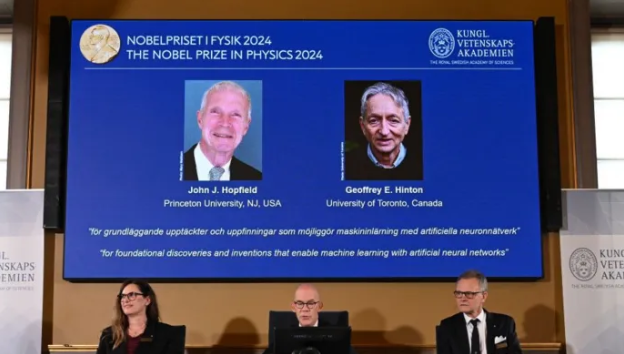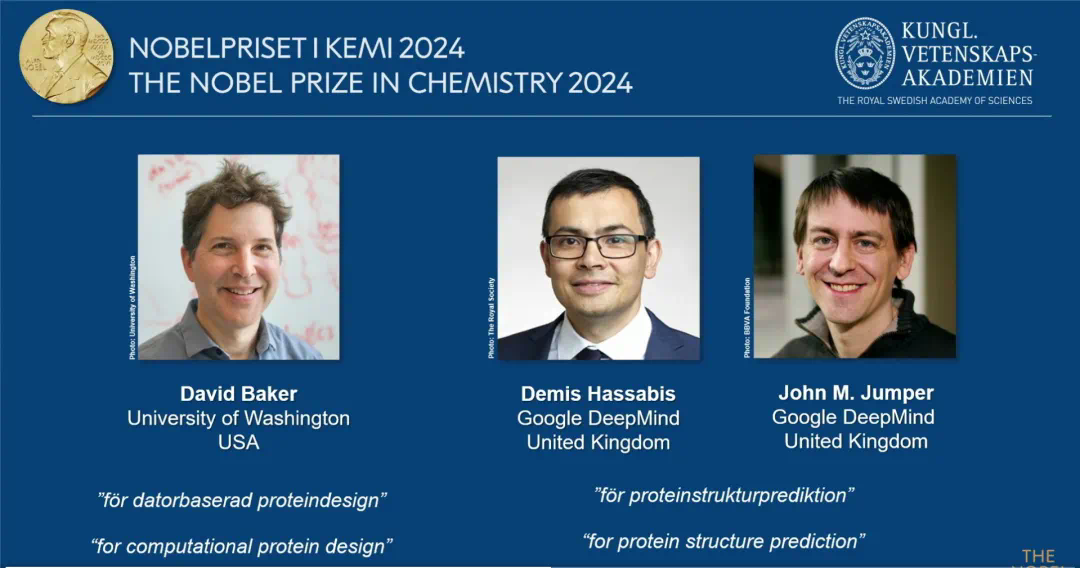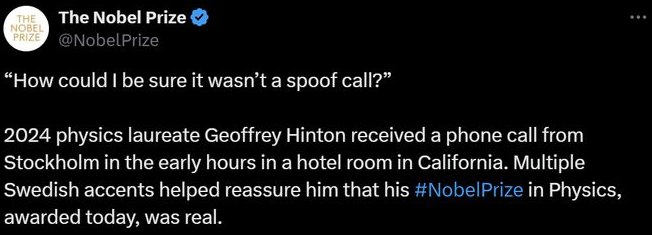Eine Woche der bedeutenden Ereignisse in der KI-Forschung - KI-Pioniere gewinnen den Nobelpreis

Vorstellung
Der Nobelpreis wird seit 1901 jährlich verliehen und basiert auf dem Testament des schwedischen Chemikers Alfred Nobel. Er umfasst fünf Kategorien: Physik, Chemie, Physiologie oder Medizin, Literatur und Frieden. Der Nobelpreis gilt allgemein als die prestigeträchtigste Auszeichnung in den jeweiligen Fachgebieten.
Laut der Bekanntgabe der Nobelpreise 2024haben Jeffrey Hinton und John Hopfield für ihre bahnbrechenden Arbeiten zur Schaffung der Grundlagen der modernen künstlichen Intelligenz den Physikpreis erhalten. David Baker, John Jumper und Demis Hassabis erhielten den Chemiepreis für ihre gemeinsamen Leistungen zur Entschlüsselung der Geheimnisse von Proteinen mithilfe von künstlicher Intelligenz.
In der langen Geschichte der Entwicklung der künstlichen Intelligenz war sie über einen langen Zeitraum hinweg in den Tiefen der Wissenschaft verborgen und wurde oft nicht beachtet oder finanziert. Doch die Vergabe von zwei Nobelpreisen innerhalb einer Woche deutet darauf hin, dass ihr sonniger Moment endlich gekommen ist. Es gibt jedoch auch einige Stimmen, die Zweifel an der Vergabe der Preise äußern.
Nobelpreis für Physik – Jeffrey Hinton und John Hopfield

Jeffrey Hinton und John Hopfield nutzten physikalische Methoden, um die Merkmale von Informationen zu erforschen und entwickelten Methoden, die die Grundlage für das heutige leistungsstarke maschinelle Lernen bilden. Das von Hopfield eingeführte „Hopfield-Netzwerk“ wird beschrieben, indem es mit der Energie von Spinsystemen in der Physik verglichen wird. Die von Hinton entwickelte „Boltzmann-Maschine“ verwendet Werkzeuge der statistischen Physik. Später half Hinton auf dieser Grundlage, die explosive Entwicklung des heutigen maschinellen Lernens einzuleiten, bekannt als die Revolution des tiefen Lernens. Aus diesem Grund wurden die Nobelpreise für Physik an die beiden Wissenschaftler Jeffrey Hinton und John Hopfield vergeben, um ihre Beiträge im Bereich des maschinellen Lernens zu würdigen.
Nobelpreis für Chemie – David Baker, John Jumper und Demis Hassabis

Der Nobelpreis für Chemie 2024 befasst sich mit Proteinen, einem der raffiniertesten chemischen Werkzeuge des Lebens. David Baker gelang das beinahe Unmögliche: Er konstruierte neue Arten von Proteinen. Demis Hassabis und John Jumper entwickelten ein KI-Modell namens AlphaFold 2, das ein 50 Jahre altes Problem löste: die Vorhersage komplexer Proteinstrukturen. Diese beiden Entdeckungen eröffnen weitreichende Möglichkeiten und besitzen ein enormes Potenzial. Daher wird die Hälfte des Nobelpreises für Chemie 2024 an den Professor David Baker von der University of Washington vergeben, um seine Beiträge zur „computational protein design“ zu würdigen, während die andere Hälfte an die Wissenschaftler Demis Hassabis und John M. Jumper von Google DeepMind vergeben wird, um ihre Beiträge zur Vorhersage von Proteinstrukturen zu ehren.
Verschiedene Sichtweisen auf die Preisverleihung
1. Hintons überraschende erste Reaktion:„Ist das ein Betrugsanruf?“

Als er um zwei Uhr morgens den Anruf erhielt, dachte Hinton, es sei ein Scherz. Zu diesem Zeitpunkt glaubte er nicht, dass er den Preis gewonnen hatte, bis die verschiedenen schwedischen Akzente am anderen Ende des Telefons ihm bestätigten, dass seine Nobelpreisverleihung wahr sei. Er wusste nicht einmal, dass er für den Nobelpreis in Physik nominiert war, und war sehr erstaunt.
2. Herzliche Glückwünsche

Einige Menschen äußerten nach der Nachricht ihre Glückwünsche und hielten es für angemessen, dass ihre Forschung die Grundlage für die Revolution des tiefen Lernens gelegt und die moderne künstliche Intelligenz unterstützt hat.
3. Einige kritische Stimmen


Einige kritische Stimmen äußerten, dass diese Forschungen nicht eng mit der Physik verbunden seien und die Vergabe des Preises daher sehr unangebracht sei.
Was bedeutet die Vergabe des Nobelpreises an interdisziplinäre Forschung für die KI-Forschung?
Künstliche Intelligenz steht in engem Zusammenhang mit Physik, Biologie und Chemie. Wenn man sehr komplexe Daten in ein neuronales Netzwerk eingibt, kann es schichtweise wirksame Schlüsselinformationen extrahieren. Dabei handelt es sich um einen Informationsfluss, der auch in der Hochenergiephysik ähnlich vorkommt; beide Prozesse bestehen im Wesentlichen darin, nützliche Informationen zu extrahieren. Dies verdeutlicht die interdisziplinären Eigenschaften.
Die Tatsache, dass AI-Wissenschaftler den Nobelpreis erhalten, zeigt die zunehmende Bedeutung von künstlicher Intelligenz in der wissenschaftlichen Forschung und verdeutlicht, dass KI-Technologie nicht nur ein Werkzeug ist, sondern zu einem der zentralen treibenden Kräfte für wissenschaftliche Entdeckungen und Innovationen geworden ist. Diese Preisvergabe könnte mehr Wissenschaftler dazu ermutigen, sich im Bereich der KI-Forschung zu engagieren und effizientere Rechenmethoden und Algorithmen zu entwickeln.
Nachdenken
Künstliche Intelligenz hat in unserem täglichen Leben zahlreiche Anwendungsmöglichkeiten gefunden, wie z.B. Textverarbeitung bei XXAI, Spracherkennung mit GPT und Bildbearbeitung mit DALLE.

Heute dringt künstliche Intelligenz allmählich in viele Disziplinen wie Biologie, Chemie, Physik, Astronomie, Materialwissenschaften und Medizin vor und hilft Wissenschaftlern, datengestützte Forschungen durchzuführen. Wir bewegen uns in eine Ära, in der interdisziplinäre Ansätze aufblühen. Künstliche Intelligenz ist das Ergebnis eines Zusammenflusses mehrerer Disziplinen wie Informatik, Physik und Mathematik. Sie hat nicht nur tiefgreifende Auswirkungen auf Datenanalysen und Ingenieurdienstleistungen, sondern verändert auch die Methoden in der Biologie, Astronomie und der traditionellen Physik grundlegend. Ihre Bedeutung für die Veränderung wissenschaftlicher Forschungsansätze ist unbestreitbar, und interdisziplinäre Ansätze spielen eine Schlüsselrolle bei der Förderung der Entwicklung von Computertechnologien.
Daher ist die Frage, ob es problematisch ist, dass Pioniere der künstlichen Intelligenz den Nobelpreis erhalten, nicht relevant; vielmehr sollte es als eine ermutigende Entwicklung angesehen werden.